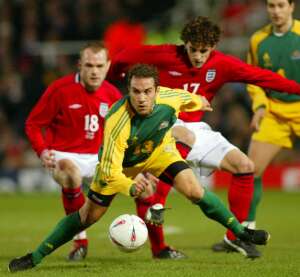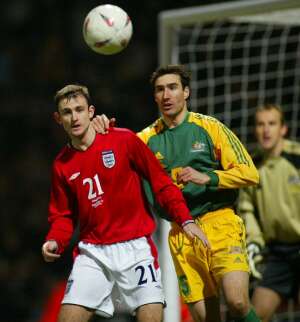|
It is a country which perhaps more than any other developed nation derives it’s sense of national identity from sport, and more particularly, from sporting success. The combination of a highly developed infrastructure and an insatiable desire to achieve means visiting the country can be a humiliating experience for an Englishman.
I chose a particularly bad time. On the rugby field, the British Lions had just lost the test series against the Wallabies 2-1, and the Australians were embarrassing our cricketers in the ashes, romping to a 3-0 lead in the series whilst I was there before some pride was regained at Headingley after I left. I heard all the jokes. But at least I was able to point to football as a sport in which we held the upper hand.
No longer. This week, in a match that only meant anything to one of the teams who turned up, England were embarrassingly, abjectly and completely beaten by their Australian counterparts. The other two teams which turned up treated the match as a glorified training session. The senior players who were supposed to give England a lead before allowing the young guns their head in the second half, didn’t really want to be there. Presumably, they would rather have attended a celebrity function or taken the wife out for dinner.
It was as pointless an exercise as it was, ultimately, embarrassing. It was a waste of time and money for those who had paid good money in the hope of watching a decent game of football. Potentially more significantly, the game re-opened the debate over whether these international friendlies serve any purpose whatsoever any longer.
It is an argument without an easy solution. But lets get something out of the way straight away. The England team does matter. Perhaps we don’t support it with the same intensity as we do Burnley, but when a major championship comes round, the sense of national expectation which surrounds a big game is tangible. For the Brazil game in the world cup, the country came to a stand still and there was a real sense of deflation when we lost.
We do, then, want to see England do well. We want to see England win things. If that was the reaction that a world cup quarter-final commands, then the scenes on final day would be very special indeed. And if England are going to win things, then they need to give the players charged with achieving that objective the opportunity to grow together as a team. They need the chance to play teams from continents other than Europe. It is friendly matches, rather than the pressure-cooker environment of a qualifying match against another European team, that provides it.
|
But the whole problem has to be viewed in the context of increasingly bitter club versus country divide. Clubs pay their players glittering rewards in the hope that they will deliver success to that club. International football is nothing but an irritant blocking that path, a stage which only represents an injury hazard to those expensive stars.
But even the smaller clubs, even those who do not contribute players to the England cause, have an interest in this debate. Sven Goran Eriksson says there are too many games, and would like to reduce the size of the Premiership; ask supporters of West Brom or Birmingham, or even Burnley fans, whether they fancy having two less top flight births to fight for. Turkeys wouldn’t vote for Christmas; football clubs will not vote to diminish their chances of staying amongst the elite.
It is because of this conflict of interests that Sven Goran Eriksson has taken the approach to friendly matches that he has. But understandable as it may be, it is still wrong. Eriksson would be better making do with training camps during the season, and then lining up a two or three of meaningful friendlies at either end of the domestic season. As for introducing young players into the squad, Eriksson can learn as much about whether the youngsters are ready from watching them in club action against the top domestic teams, or in European competition, as he can from games like the one on Wednesday night.
Then he can introduce them when they force their way into the team, and force some of those players who did not perform on Wednesday night to work for a place in the team. That is the way in which a squad should work. And as for winning that world cup: it would be nice, but only if it does not come at the expense of Burnley Football Club. In this country, the hard truth is that the clubs come first.
They don’t think like that in Australia.


